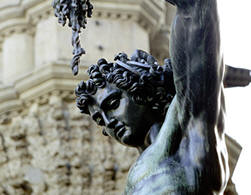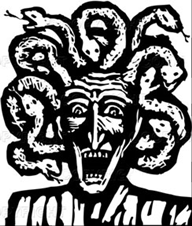Rethinking Gifts VI
 The Greek hero Perseus was sent into exile as a child by his fearful grandfather who was told by an oracle that his grandson would one day bring an end to his rule. He and his mother Danae were locked in a wooden chest and set adrift on the sea until one day they landed on the shores of the island of Seriphos. The young hero grew up on this island with no real idea of his place in the world. He was lost. He doubted himself and his ability to face the serious challenges of life.
The Greek hero Perseus was sent into exile as a child by his fearful grandfather who was told by an oracle that his grandson would one day bring an end to his rule. He and his mother Danae were locked in a wooden chest and set adrift on the sea until one day they landed on the shores of the island of Seriphos. The young hero grew up on this island with no real idea of his place in the world. He was lost. He doubted himself and his ability to face the serious challenges of life. One day, the king of the island, Polydectes, demanded tribute from Perseus and his mother, a tribute that neither could afford to pay. Perseus pleaded with the king, saying that he had nothing to offer but his service. The king, seizing the opportunity, assigned to Perseus what seemed to be an impossible task: he wanted the head of the fearsome Gorgon Medusa. The Gorgons were creatures, loathed by gods and men, whose hair was comprised of venomous snakes. They possessed the chilling ability to turn those that gazed upon her hideous faces into stone.
One day, the king of the island, Polydectes, demanded tribute from Perseus and his mother, a tribute that neither could afford to pay. Perseus pleaded with the king, saying that he had nothing to offer but his service. The king, seizing the opportunity, assigned to Perseus what seemed to be an impossible task: he wanted the head of the fearsome Gorgon Medusa. The Gorgons were creatures, loathed by gods and men, whose hair was comprised of venomous snakes. They possessed the chilling ability to turn those that gazed upon her hideous faces into stone.Perseus was faced with a challenge that tested the strength of his resolve. Was he up to the challenge? Imagine the thoughts that might have gone through his mind at the time. “This is too big for me. I will fail if I try. She’ll turn me to stone like all the rest!” That is the critical moment when the goddess Athena entered the story. She too followed the mythical pattern we have described previously. Perseus encountered Athena—or perhaps we should say, Athena arranged for the meeting. She counseled the young Perseus, encouraging him with her words.
 Demonstrating her faith in the young hero in a way that was very concrete, Athena gave him her very own shield, a reflective shield that would allow him to see Medusa without gazing directly at her. She further directed him where to acquire the other tools he would need to complete his quest, including a sword, a helmet of invisibility, winged sandals, and a magical bag. The young hero went forth, knowing that a goddess believed that there was something in him that was capable of accomplishing great deeds. He also carried with him the physical representation of Athena’s belief in him, the shield, sword, and other implements necessary to achieve his goal.
Demonstrating her faith in the young hero in a way that was very concrete, Athena gave him her very own shield, a reflective shield that would allow him to see Medusa without gazing directly at her. She further directed him where to acquire the other tools he would need to complete his quest, including a sword, a helmet of invisibility, winged sandals, and a magical bag. The young hero went forth, knowing that a goddess believed that there was something in him that was capable of accomplishing great deeds. He also carried with him the physical representation of Athena’s belief in him, the shield, sword, and other implements necessary to achieve his goal.Labels: Athena, belief, challenge, encouragement, faith, gifts, Greek, helmet, Medusa, myth, mythology, Perseus, resolve, shield, sword, winged sandals



0 Comments:
Post a Comment
<< Home